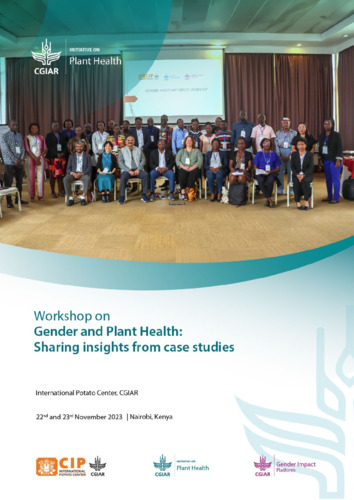The workshop on Gender and Plant Health: Sharing insights from case studies
Abstract
Gender and Plant Health has often been seen as a very unusual combination, since two disciplines have a different epistemological orientation, use different languages, and have limited experience in working together.
Over the past two years, CGIAR Plant Health Initiative has made a progress to bring natural and social scientists together to find common language and research agenda. This process has involved cultural shock and confusion, but the collective effort we put has eventually helped us to find inspiration and develop novel ideas. We agree that if plant health initiative incorporates gender perspectives in research and technology designs, interventions will be more effective and technology adoption rate will increase, contributing to overall household food security, climate resilience, and women’s empowerment.
Several interdisciplinary studies have been carried out to understand women’s and men’s direct and indirect roles in plant pest and disease management, gender differences in knowledge in pest and disease identification, and/or the feasibility of decision support tools among the different types of farmers, especially women farmers.
The next step was to analyse data and develop recommendations for gender-responsive interventions with more equitable and inclusive scaling approaches. This required in-person discussion with scientists and partners from various academic background to contribute from their disciplinary perspectives. To this end, the workshop was held with following specific objectives:
To share key findings and insights from field work on understanding gender and social dimensions of plant health
To exchange interdisciplinary research tools and methods to ensure gender-responsive plant-health research.
To identify and link relevant literature into research findings
To develop a draft report including literature review and recommendation
Total 34 participants (23 women and 11 men, 85% natural scientists) from six research teams across 16 countries joined the workshop. A peer learning approach was employed to ensure active and inclusive participation of all attendees.
Overall, the workshop was very successful with 100% satisfaction rate (92% very satisfied). The literature review was collectively conducted, and draft reports/concept notes were submitted by all six teams.
In the panel discussion, participants shared their opinions of how science they had been trained was gender-blinded and how we could change this by integrating a gender lens; how a gender lens helps strengthen the link between laboratories and farmers’ fields; and how women’s work both as farmers and as scientists are embedded in gender norms and culture.
During the world café, three research teams shared their research questions, methods and preliminary findings. This helped participants to find the common ideas and issues which all participants address in various countries for different crops. Participants also realized the power of interdisciplinary research that reveals women’s constraints which were previously neglected in disciplinary research.
Group work included three exercises: 1) to recognize women’s important roles in plant pest and disease management, 2) to identify communication channels to improve knowledge sharing mechanisms between researchers and women farmers, and 3) to propose ideas to address constraints women face in pest and disease management.
The six research teams then developed the report structure and spent time especially on the introduction section to develop a clear statement of knowledge gaps they address by linking their research into the literature. The teams also discussed recommendations for ensuring women to benefit from plant health innovations in terms of the content of technologies and approaches to introducing them to women, which were described in this workshop report.
I thank all participants for their valuable contribution, CIP logistics team who provided great hospitality and care, and the Plant Health and Gender Impact Platform for their funding support to organize this workshop. This group will continue working together through Gender and Plant Health Research Network, a platform to make a difference in plant health research and interventions for equity, inclusivity, and efficiency.

